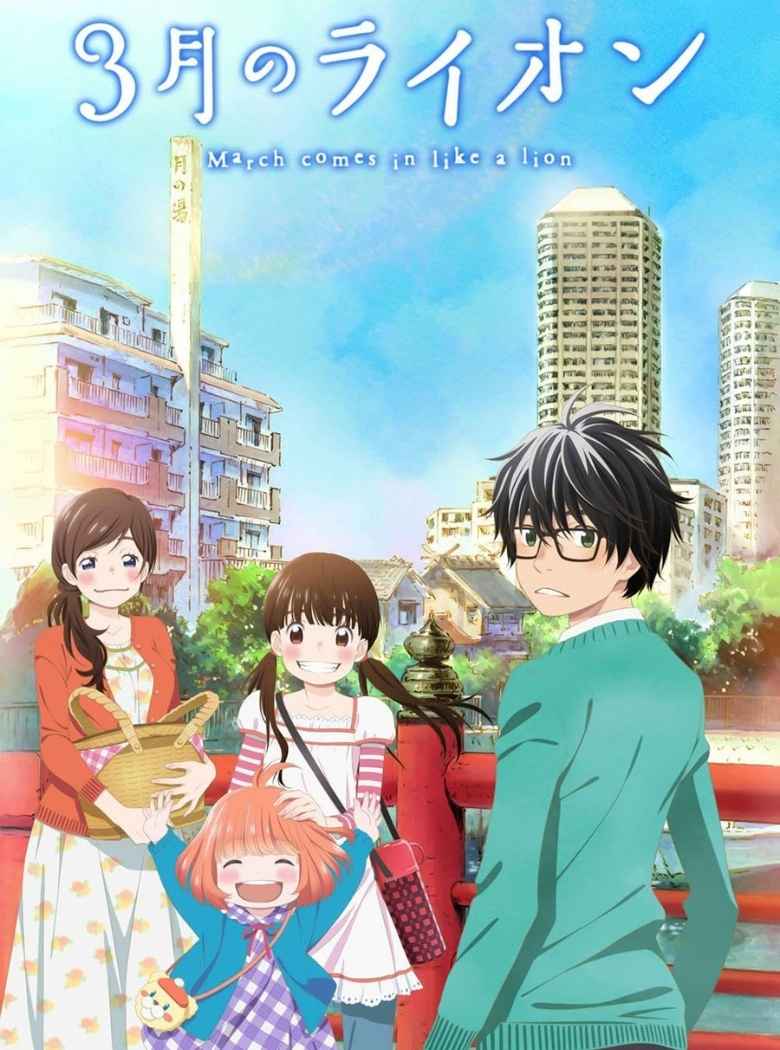March Comes in Like a Lion is a gentle, emotional story about pain, healing, and the quiet search for happiness. It follows a teenage boy who carries the weight of loneliness and sorrow while trying to find meaning in a world that often feels too heavy. Through soft moments, loving people, and silent battles, the series shows how a broken heart can slowly begin to mend. It is calm, kind, and deeply human.

Series Details
| Title | March Comes in Like a Lion |
|---|---|
| Director | Akiyuki Shinbo, Kenjirou Okada |
| Studio | Shaft |
| Release Date | October 8, 2016 |
| Runtime | 44 Episodes (2 Seasons) |
| Genre | Drama, Slice of Life, Psychological |
| Language | Japanese |
| IMDb Rating | 8.3/10 |
| Review Count | 3700+ |
| IMDb Link | IMDb Page |
Series Explanation
Rei Kiriyama is only seventeen, but he lives alone in a quiet apartment, far from joy and connection. He is a professional shogi player, a young prodigy who once rose to fame, but now struggles with the emptiness in his heart. His past is filled with sorrow—his parents and sister died in an accident when he was a child, and he was taken in by a friend of his father, a strict man who expected too much too soon. Shogi became both a gift and a burden. It gave him a path but took away his childhood.
Rei carries this quiet sadness with him every day. At school, he doesn’t have friends. At home, he eats alone. He plays shogi not out of passion, but to survive. Winning makes people respect him, but it doesn’t make him feel alive. He often wonders what the point of everything is. His world is dark, gray, and filled with self-blame.
Then, one day, three sisters gently step into his life. Akari, the eldest, is kind and motherly. Hinata is cheerful and strong-willed. Momo is small and innocent. They live in a warm, old house with their grandfather, running a wagashi (traditional sweets) shop. Their home is filled with food, laughter, and the kind of love Rei has forgotten exists. Slowly, they invite him in—not with force, but with kindness. They feed him. They listen. They don’t expect him to smile or change. They simply accept him.
As Rei spends more time with them, something begins to shift inside him. He starts to feel emotions again—guilt, sadness, warmth, even joy. He still plays shogi, facing strong opponents and harsh matches. But now, his reasons begin to change. He starts wanting to play not just to win, but to grow. To move forward.
Each character around Rei adds something important to his journey. There is Nikaidou, a loud and loving rival who refuses to let Rei be alone. There is Shimada, a wise older player who becomes a quiet mentor. And there is Hinata, whose own painful school life teaches Rei how brave the heart can be. When she is bullied at school but stands up for a friend, Rei sees a new kind of strength—one that doesn’t come from shogi or winning, but from love.
Throughout the seasons, the story moves gently through Rei’s ups and downs. It never hurries. It lets you sit with his pain, his confusion, and his healing. The visuals shift with his emotions. Bright when he feels warmth, cold and blue when he sinks into old sadness. The music, the pacing, the silences—they all speak to what words cannot.
By the end of the story, Rei is still quiet. He is still thoughtful and unsure at times. But he is no longer alone. He has people who care about him. He laughs more. He listens more. He starts to find meaning in simple things—tea on a cold day, a shared meal, a game played with respect. He begins to live, not just survive. And that soft change is more powerful than any grand ending.
Main Cast
| Character | Voice Actor (Japanese) |
|---|---|
| Rei Kiriyama | Kengo Kawanishi |
| Akari Kawamoto | Ai Kayano |
| Hinata Kawamoto | Kana Hanazawa |
| Momo Kawamoto | Misaki Kuno |
| Harunobu Nikaidou | Nobuhiko Okamoto |
| Kai Shimada | Akira Ishida |
My Honest Review
March Comes in Like a Lion is one of the most beautiful series I’ve ever watched. It doesn’t try to impress with action or fantasy. Instead, it opens its heart quietly and asks you to listen. Rei’s pain feels real, and his healing feels earned. The way the story shows sadness, kindness, and growth is gentle but powerful. Every character matters. Every small moment feels meaningful. This show doesn’t shout—it whispers. And those whispers will stay in your heart long after the final episode.
Trailer
What the Series Teaches Us
This series teaches us that it’s okay to be lost. It shows that sadness doesn’t mean weakness, and kindness doesn’t always need loud words. It reminds us that healing is not a quick fix—it’s slow, sometimes painful, but always possible. It also teaches that the people who come into our lives, even quietly, can help us stand up again. March Comes in Like a Lion tells us that even on the darkest days, a little warmth can begin to grow.
FAQ
Is this anime about shogi?
Shogi plays a big role, but the story is more about emotions, relationships, and personal growth than just the game.
Is it a sad anime?
Yes, it deals with heavy emotions like grief and loneliness, but it also has hope, love, and healing.
Do I need to understand shogi to enjoy it?
Not at all. The story explains just enough, but the focus is on characters and feelings.
Is there a Season 3?
As of now, no official Season 3 has been announced, but the manga continues beyond the anime.
Can teenagers relate to it?
Yes. It deeply explores what it means to grow up with pain and how to find strength in gentle places.







